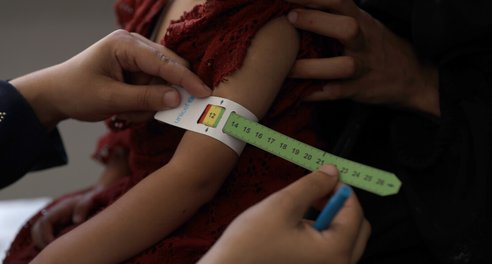A new report by the Integrated Food Security Phase Classification (IPC) has confirmed Palestinians cannot escape famine in Gaza, marking the first time that famine has been officially confirmed in the Middle East.
The worsening of conditions comes as Israel escalates its military assault on Gaza City, where malnutrition rates and deaths due to hunger, disease and bombing are already at catastrophic levels. The assault will force 800,000 hungry Palestinians to flee, with many already displaced more than ten times in less than two years.
Jolien Veldwijk, CARE Palestine’s country director, said:
“Palestinians who have survived months of starvation, bombardment and displacement are now wasting away from malnutrition. They face the constant risk of illness and disease amid a crippling blockade, preventing food and supplies from reaching the most vulnerable. Now, with an assault on Gaza City, many will have no choice but to make a perilous journey on foot to southern Gaza where they’ll face renewed displacement at overcrowded sites that lack the necessities for survival.”
Famine in Gaza is manmade and caused by Israel’s siege, obstruction of aid, targeting of agricultural lands, crops and businesses, and the mass displacement of civilians. The number of children under the age of five at risk of death from acute malnutrition has doubled since May. Nearly 55,500 malnourished pregnant and breastfeeding women require urgent help. This tragedy has been fuelled by global inaction that has allowed civilian harm to escalate.
Samah Wadi, a nutritional expert working at CARE’s primary healthcare centre in Deir Al-Balah, said:
“We are all being starved, we are losing the energy needed to carry on with daily chores. Hunger is all we can think about. Malnutrition not only impacts your body, but your mind and your soul. We know that children, as well as pregnant and breastfeeding women are amongst the most vulnerable. Every day, 35 of every 40 women I screen suffer from malnutrition, while 20 out of every 40 children we screen suffer from moderate to severe acute malnutrition. People at our clinic, they think nutritional supplements can replace food, then you are forced to explain that these nutritional supplements are just complementary. People are looking for anything to survive on, to hold onto, even if it means it will only save them for another couple of hours.”
When the IPC’s alert on Gaza was issued last month, more than 100 deaths from malnutrition had been recorded. Over the few weeks since then, that number has grown to 266, including more than 100 children. Yet this figure does not paint a full picture of the suffering. These are only the verified deaths. The actual number is likely higher.
Media enquiries
For all media enquiries, please contact Zaina Alibhai on alibhai@careinternational.org



